Mental State in Health Care Context
VerifiedAdded on 2023/03/31
|8
|2027
|136
AI Summary
This document discusses the assessment of mental state and its importance in understanding emotions, cognitive functioning, and thinking process of service users. It explores the case of Alison, a woman suffering from mental illness, and discusses the potential risks and treatment options. The document also provides references for further reading.
Contribute Materials
Your contribution can guide someone’s learning journey. Share your
documents today.
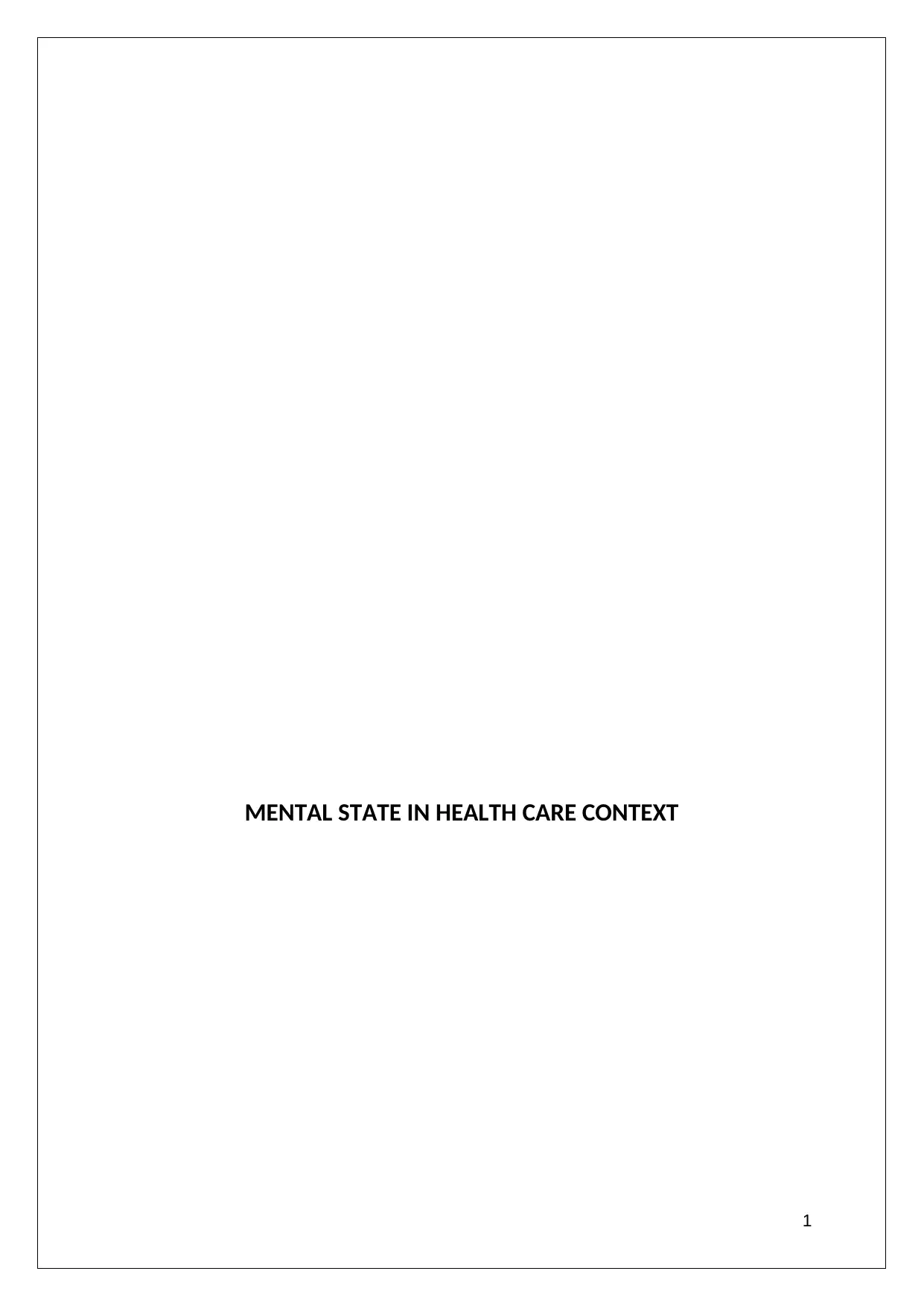
MENTAL STATE IN HEALTH CARE CONTEXT
1
1
Secure Best Marks with AI Grader
Need help grading? Try our AI Grader for instant feedback on your assignments.
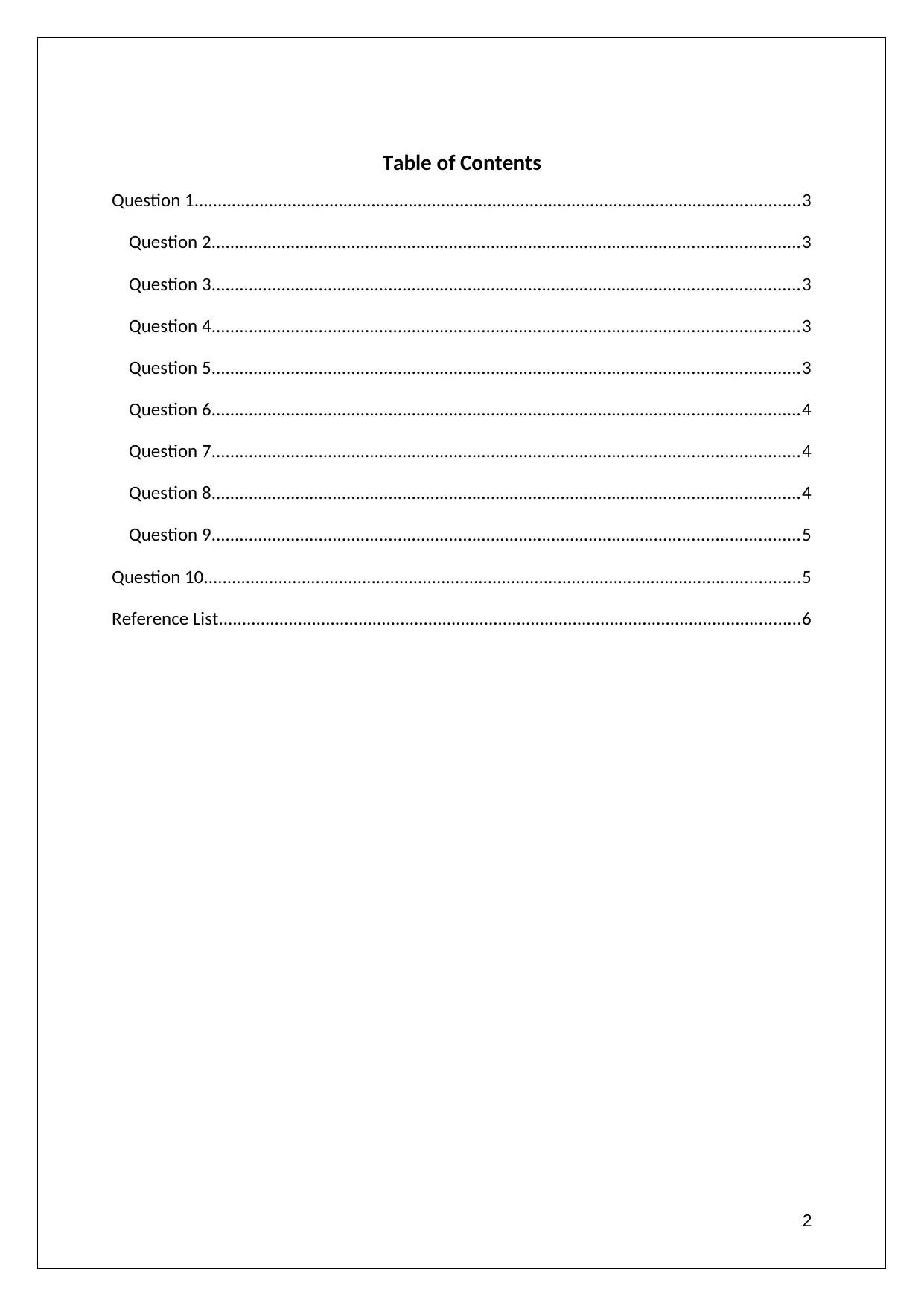
Table of Contents
Question 1..................................................................................................................................3
Question 2..............................................................................................................................3
Question 3..............................................................................................................................3
Question 4..............................................................................................................................3
Question 5..............................................................................................................................3
Question 6..............................................................................................................................4
Question 7..............................................................................................................................4
Question 8..............................................................................................................................4
Question 9..............................................................................................................................5
Question 10................................................................................................................................5
Reference List.............................................................................................................................6
2
Question 1..................................................................................................................................3
Question 2..............................................................................................................................3
Question 3..............................................................................................................................3
Question 4..............................................................................................................................3
Question 5..............................................................................................................................3
Question 6..............................................................................................................................4
Question 7..............................................................................................................................4
Question 8..............................................................................................................................4
Question 9..............................................................................................................................5
Question 10................................................................................................................................5
Reference List.............................................................................................................................6
2
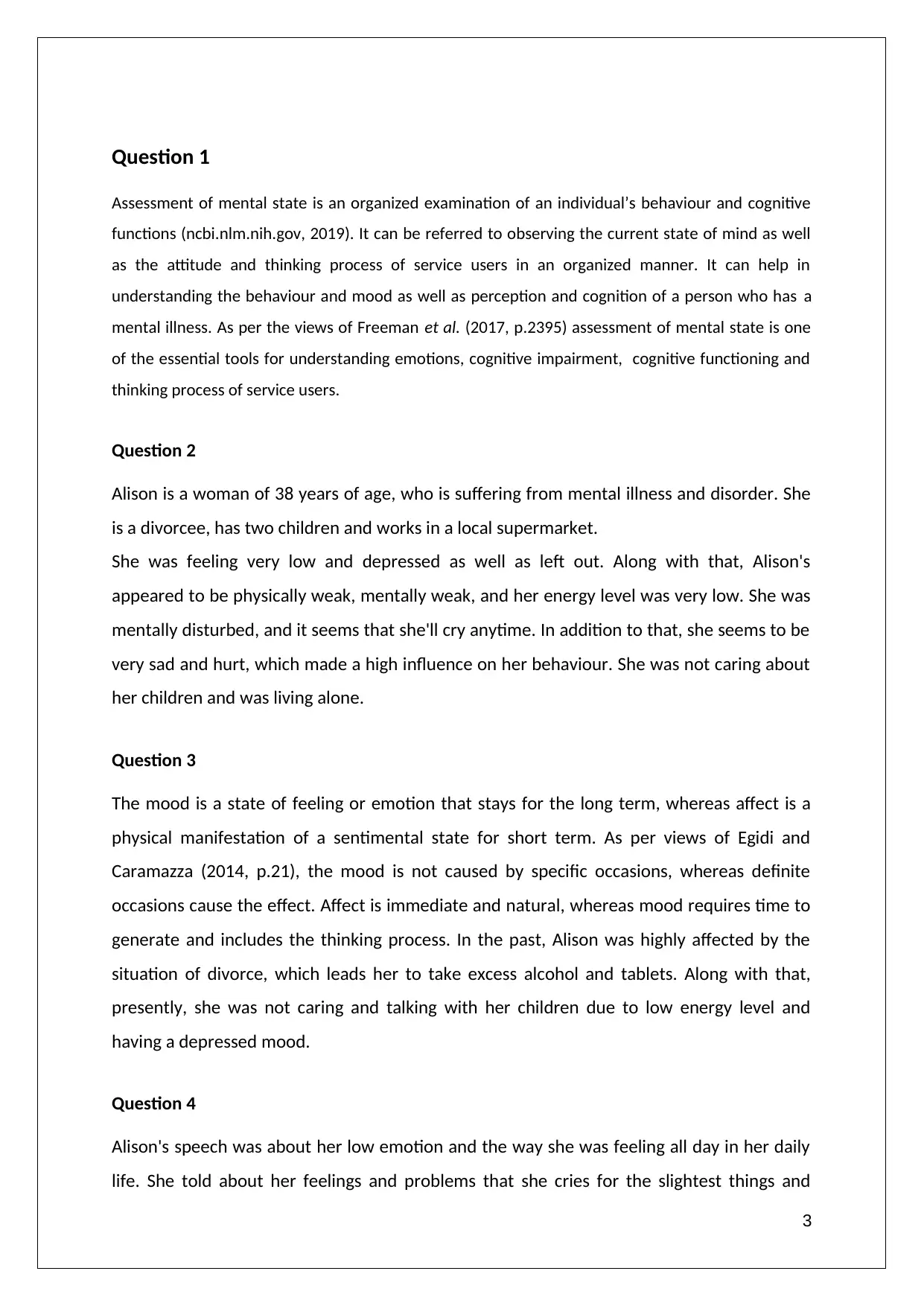
Question 1
Assessment of mental state is an organized examination of an individual’s behaviour and cognitive
functions (ncbi.nlm.nih.gov, 2019). It can be referred to observing the current state of mind as well
as the attitude and thinking process of service users in an organized manner. It can help in
understanding the behaviour and mood as well as perception and cognition of a person who has a
mental illness. As per the views of Freeman et al. (2017, p.2395) assessment of mental state is one
of the essential tools for understanding emotions, cognitive impairment, cognitive functioning and
thinking process of service users.
Question 2
Alison is a woman of 38 years of age, who is suffering from mental illness and disorder. She
is a divorcee, has two children and works in a local supermarket.
She was feeling very low and depressed as well as left out. Along with that, Alison's
appeared to be physically weak, mentally weak, and her energy level was very low. She was
mentally disturbed, and it seems that she'll cry anytime. In addition to that, she seems to be
very sad and hurt, which made a high influence on her behaviour. She was not caring about
her children and was living alone.
Question 3
The mood is a state of feeling or emotion that stays for the long term, whereas affect is a
physical manifestation of a sentimental state for short term. As per views of Egidi and
Caramazza (2014, p.21), the mood is not caused by specific occasions, whereas definite
occasions cause the effect. Affect is immediate and natural, whereas mood requires time to
generate and includes the thinking process. In the past, Alison was highly affected by the
situation of divorce, which leads her to take excess alcohol and tablets. Along with that,
presently, she was not caring and talking with her children due to low energy level and
having a depressed mood.
Question 4
Alison's speech was about her low emotion and the way she was feeling all day in her daily
life. She told about her feelings and problems that she cries for the slightest things and
3
Assessment of mental state is an organized examination of an individual’s behaviour and cognitive
functions (ncbi.nlm.nih.gov, 2019). It can be referred to observing the current state of mind as well
as the attitude and thinking process of service users in an organized manner. It can help in
understanding the behaviour and mood as well as perception and cognition of a person who has a
mental illness. As per the views of Freeman et al. (2017, p.2395) assessment of mental state is one
of the essential tools for understanding emotions, cognitive impairment, cognitive functioning and
thinking process of service users.
Question 2
Alison is a woman of 38 years of age, who is suffering from mental illness and disorder. She
is a divorcee, has two children and works in a local supermarket.
She was feeling very low and depressed as well as left out. Along with that, Alison's
appeared to be physically weak, mentally weak, and her energy level was very low. She was
mentally disturbed, and it seems that she'll cry anytime. In addition to that, she seems to be
very sad and hurt, which made a high influence on her behaviour. She was not caring about
her children and was living alone.
Question 3
The mood is a state of feeling or emotion that stays for the long term, whereas affect is a
physical manifestation of a sentimental state for short term. As per views of Egidi and
Caramazza (2014, p.21), the mood is not caused by specific occasions, whereas definite
occasions cause the effect. Affect is immediate and natural, whereas mood requires time to
generate and includes the thinking process. In the past, Alison was highly affected by the
situation of divorce, which leads her to take excess alcohol and tablets. Along with that,
presently, she was not caring and talking with her children due to low energy level and
having a depressed mood.
Question 4
Alison's speech was about her low emotion and the way she was feeling all day in her daily
life. She told about her feelings and problems that she cries for the slightest things and
3
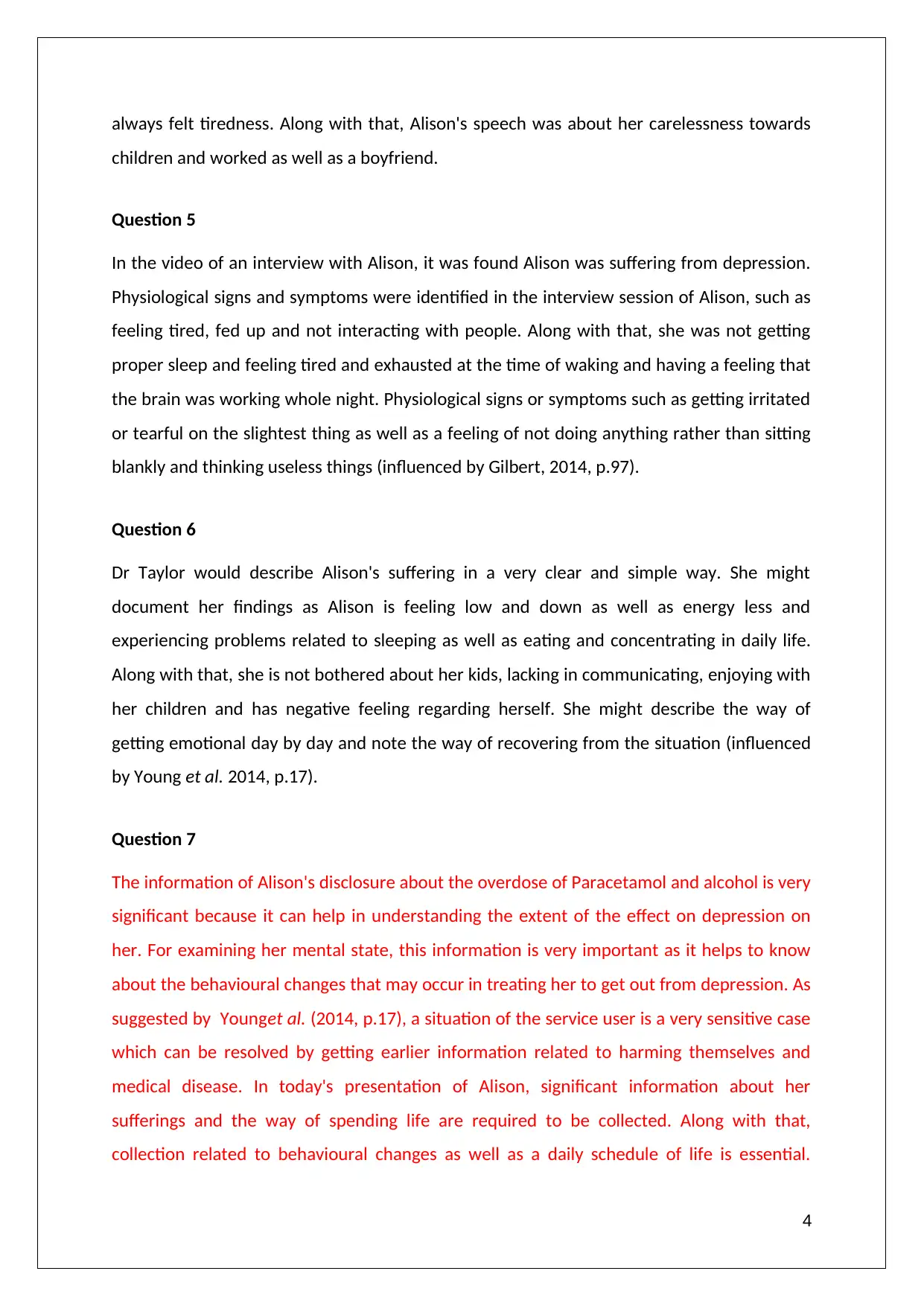
always felt tiredness. Along with that, Alison's speech was about her carelessness towards
children and worked as well as a boyfriend.
Question 5
In the video of an interview with Alison, it was found Alison was suffering from depression.
Physiological signs and symptoms were identified in the interview session of Alison, such as
feeling tired, fed up and not interacting with people. Along with that, she was not getting
proper sleep and feeling tired and exhausted at the time of waking and having a feeling that
the brain was working whole night. Physiological signs or symptoms such as getting irritated
or tearful on the slightest thing as well as a feeling of not doing anything rather than sitting
blankly and thinking useless things (influenced by Gilbert, 2014, p.97).
Question 6
Dr Taylor would describe Alison's suffering in a very clear and simple way. She might
document her findings as Alison is feeling low and down as well as energy less and
experiencing problems related to sleeping as well as eating and concentrating in daily life.
Along with that, she is not bothered about her kids, lacking in communicating, enjoying with
her children and has negative feeling regarding herself. She might describe the way of
getting emotional day by day and note the way of recovering from the situation (influenced
by Young et al. 2014, p.17).
Question 7
The information of Alison's disclosure about the overdose of Paracetamol and alcohol is very
significant because it can help in understanding the extent of the effect on depression on
her. For examining her mental state, this information is very important as it helps to know
about the behavioural changes that may occur in treating her to get out from depression. As
suggested by Younget al. (2014, p.17), a situation of the service user is a very sensitive case
which can be resolved by getting earlier information related to harming themselves and
medical disease. In today's presentation of Alison, significant information about her
sufferings and the way of spending life are required to be collected. Along with that,
collection related to behavioural changes as well as a daily schedule of life is essential.
4
children and worked as well as a boyfriend.
Question 5
In the video of an interview with Alison, it was found Alison was suffering from depression.
Physiological signs and symptoms were identified in the interview session of Alison, such as
feeling tired, fed up and not interacting with people. Along with that, she was not getting
proper sleep and feeling tired and exhausted at the time of waking and having a feeling that
the brain was working whole night. Physiological signs or symptoms such as getting irritated
or tearful on the slightest thing as well as a feeling of not doing anything rather than sitting
blankly and thinking useless things (influenced by Gilbert, 2014, p.97).
Question 6
Dr Taylor would describe Alison's suffering in a very clear and simple way. She might
document her findings as Alison is feeling low and down as well as energy less and
experiencing problems related to sleeping as well as eating and concentrating in daily life.
Along with that, she is not bothered about her kids, lacking in communicating, enjoying with
her children and has negative feeling regarding herself. She might describe the way of
getting emotional day by day and note the way of recovering from the situation (influenced
by Young et al. 2014, p.17).
Question 7
The information of Alison's disclosure about the overdose of Paracetamol and alcohol is very
significant because it can help in understanding the extent of the effect on depression on
her. For examining her mental state, this information is very important as it helps to know
about the behavioural changes that may occur in treating her to get out from depression. As
suggested by Younget al. (2014, p.17), a situation of the service user is a very sensitive case
which can be resolved by getting earlier information related to harming themselves and
medical disease. In today's presentation of Alison, significant information about her
sufferings and the way of spending life are required to be collected. Along with that,
collection related to behavioural changes as well as a daily schedule of life is essential.
4
Secure Best Marks with AI Grader
Need help grading? Try our AI Grader for instant feedback on your assignments.
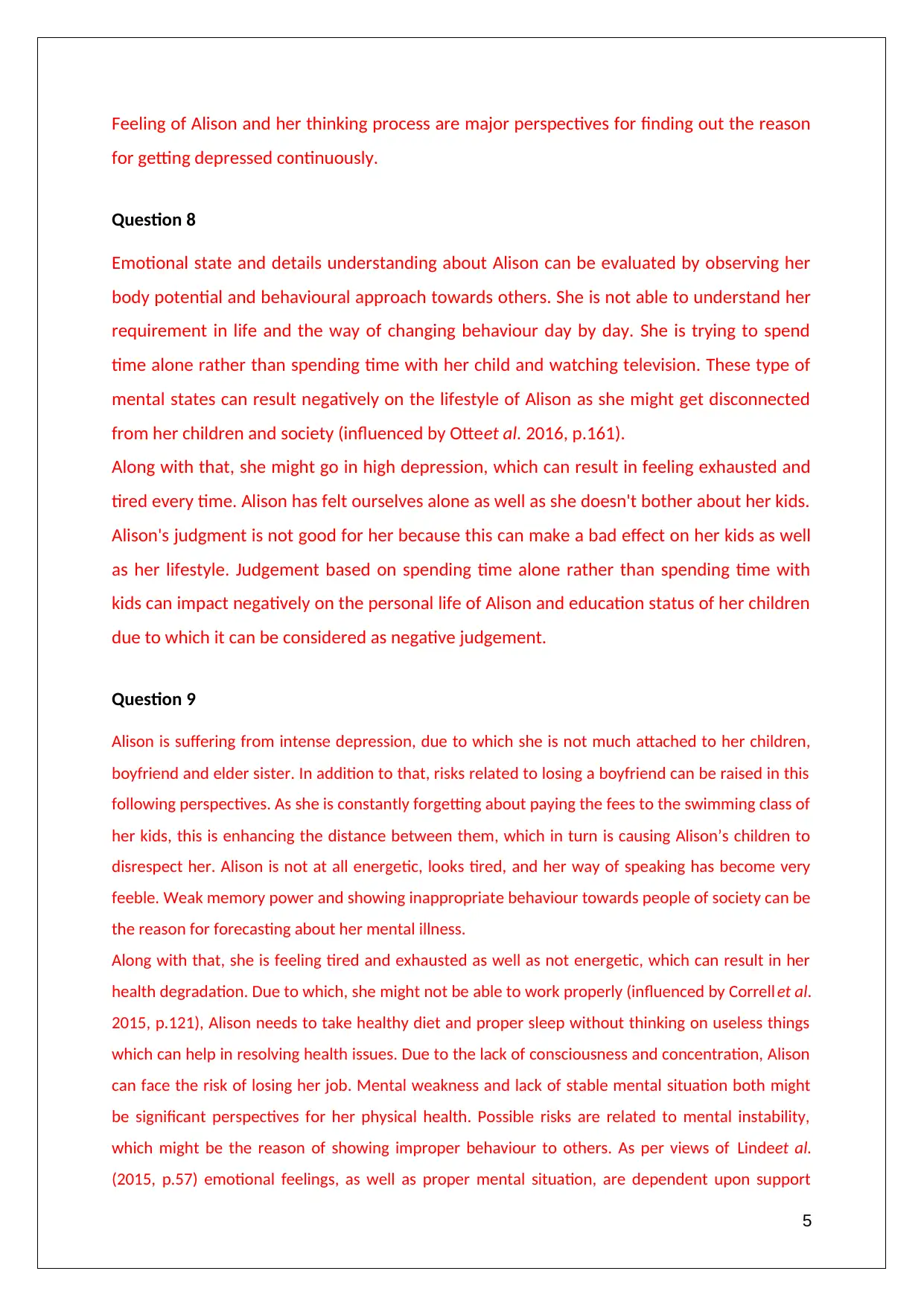
Feeling of Alison and her thinking process are major perspectives for finding out the reason
for getting depressed continuously.
Question 8
Emotional state and details understanding about Alison can be evaluated by observing her
body potential and behavioural approach towards others. She is not able to understand her
requirement in life and the way of changing behaviour day by day. She is trying to spend
time alone rather than spending time with her child and watching television. These type of
mental states can result negatively on the lifestyle of Alison as she might get disconnected
from her children and society (influenced by Otteet al. 2016, p.161).
Along with that, she might go in high depression, which can result in feeling exhausted and
tired every time. Alison has felt ourselves alone as well as she doesn't bother about her kids.
Alison's judgment is not good for her because this can make a bad effect on her kids as well
as her lifestyle. Judgement based on spending time alone rather than spending time with
kids can impact negatively on the personal life of Alison and education status of her children
due to which it can be considered as negative judgement.
Question 9
Alison is suffering from intense depression, due to which she is not much attached to her children,
boyfriend and elder sister. In addition to that, risks related to losing a boyfriend can be raised in this
following perspectives. As she is constantly forgetting about paying the fees to the swimming class of
her kids, this is enhancing the distance between them, which in turn is causing Alison’s children to
disrespect her. Alison is not at all energetic, looks tired, and her way of speaking has become very
feeble. Weak memory power and showing inappropriate behaviour towards people of society can be
the reason for forecasting about her mental illness.
Along with that, she is feeling tired and exhausted as well as not energetic, which can result in her
health degradation. Due to which, she might not be able to work properly (influenced by Correll et al.
2015, p.121), Alison needs to take healthy diet and proper sleep without thinking on useless things
which can help in resolving health issues. Due to the lack of consciousness and concentration, Alison
can face the risk of losing her job. Mental weakness and lack of stable mental situation both might
be significant perspectives for her physical health. Possible risks are related to mental instability,
which might be the reason of showing improper behaviour to others. As per views of Lindeet al.
(2015, p.57) emotional feelings, as well as proper mental situation, are dependent upon support
5
for getting depressed continuously.
Question 8
Emotional state and details understanding about Alison can be evaluated by observing her
body potential and behavioural approach towards others. She is not able to understand her
requirement in life and the way of changing behaviour day by day. She is trying to spend
time alone rather than spending time with her child and watching television. These type of
mental states can result negatively on the lifestyle of Alison as she might get disconnected
from her children and society (influenced by Otteet al. 2016, p.161).
Along with that, she might go in high depression, which can result in feeling exhausted and
tired every time. Alison has felt ourselves alone as well as she doesn't bother about her kids.
Alison's judgment is not good for her because this can make a bad effect on her kids as well
as her lifestyle. Judgement based on spending time alone rather than spending time with
kids can impact negatively on the personal life of Alison and education status of her children
due to which it can be considered as negative judgement.
Question 9
Alison is suffering from intense depression, due to which she is not much attached to her children,
boyfriend and elder sister. In addition to that, risks related to losing a boyfriend can be raised in this
following perspectives. As she is constantly forgetting about paying the fees to the swimming class of
her kids, this is enhancing the distance between them, which in turn is causing Alison’s children to
disrespect her. Alison is not at all energetic, looks tired, and her way of speaking has become very
feeble. Weak memory power and showing inappropriate behaviour towards people of society can be
the reason for forecasting about her mental illness.
Along with that, she is feeling tired and exhausted as well as not energetic, which can result in her
health degradation. Due to which, she might not be able to work properly (influenced by Correll et al.
2015, p.121), Alison needs to take healthy diet and proper sleep without thinking on useless things
which can help in resolving health issues. Due to the lack of consciousness and concentration, Alison
can face the risk of losing her job. Mental weakness and lack of stable mental situation both might
be significant perspectives for her physical health. Possible risks are related to mental instability,
which might be the reason of showing improper behaviour to others. As per views of Lindeet al.
(2015, p.57) emotional feelings, as well as proper mental situation, are dependent upon support
5
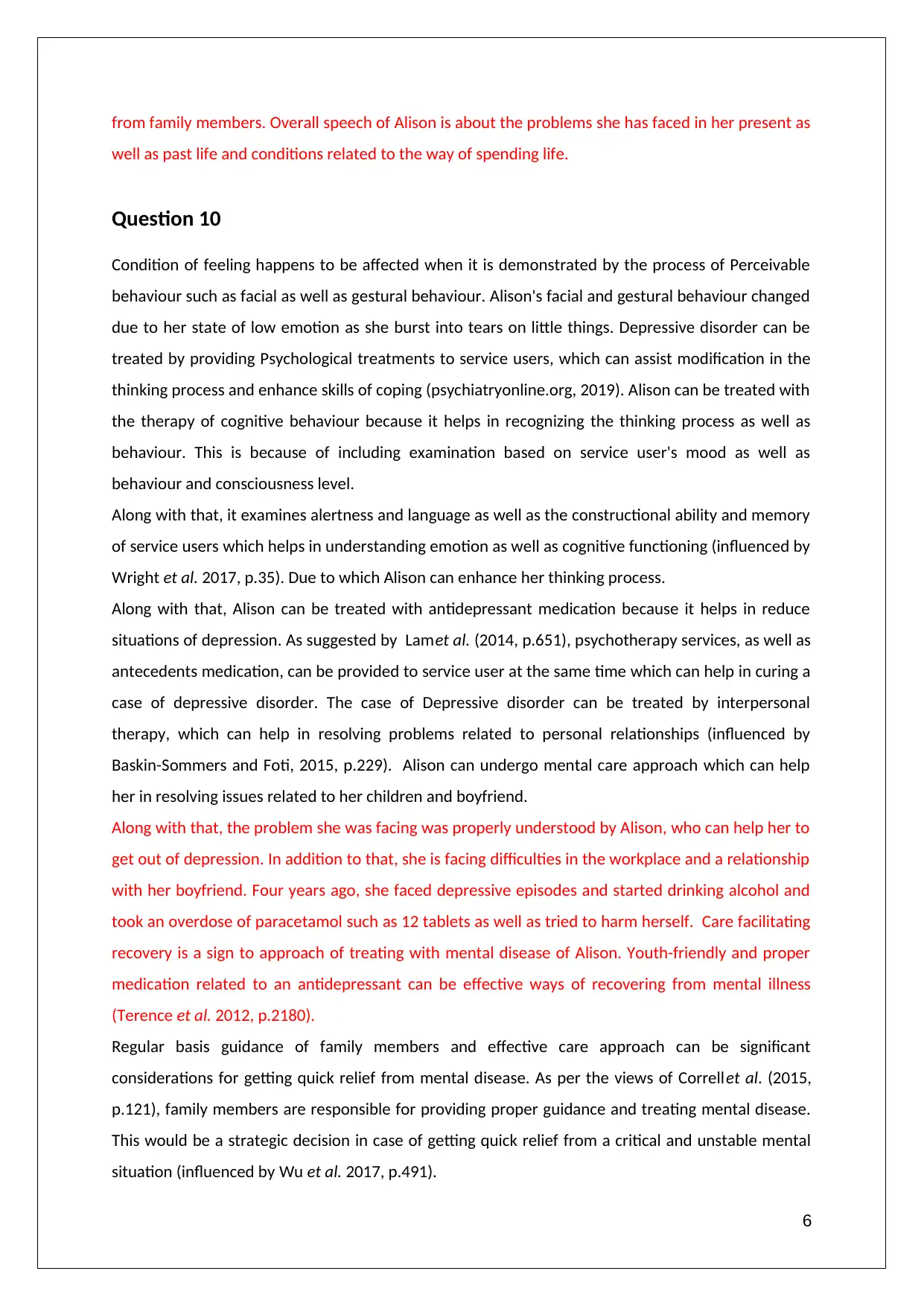
from family members. Overall speech of Alison is about the problems she has faced in her present as
well as past life and conditions related to the way of spending life.
Question 10
Condition of feeling happens to be affected when it is demonstrated by the process of Perceivable
behaviour such as facial as well as gestural behaviour. Alison's facial and gestural behaviour changed
due to her state of low emotion as she burst into tears on little things. Depressive disorder can be
treated by providing Psychological treatments to service users, which can assist modification in the
thinking process and enhance skills of coping (psychiatryonline.org, 2019). Alison can be treated with
the therapy of cognitive behaviour because it helps in recognizing the thinking process as well as
behaviour. This is because of including examination based on service user's mood as well as
behaviour and consciousness level.
Along with that, it examines alertness and language as well as the constructional ability and memory
of service users which helps in understanding emotion as well as cognitive functioning (influenced by
Wright et al. 2017, p.35). Due to which Alison can enhance her thinking process.
Along with that, Alison can be treated with antidepressant medication because it helps in reduce
situations of depression. As suggested by Lamet al. (2014, p.651), psychotherapy services, as well as
antecedents medication, can be provided to service user at the same time which can help in curing a
case of depressive disorder. The case of Depressive disorder can be treated by interpersonal
therapy, which can help in resolving problems related to personal relationships (influenced by
Baskin-Sommers and Foti, 2015, p.229). Alison can undergo mental care approach which can help
her in resolving issues related to her children and boyfriend.
Along with that, the problem she was facing was properly understood by Alison, who can help her to
get out of depression. In addition to that, she is facing difficulties in the workplace and a relationship
with her boyfriend. Four years ago, she faced depressive episodes and started drinking alcohol and
took an overdose of paracetamol such as 12 tablets as well as tried to harm herself. Care facilitating
recovery is a sign to approach of treating with mental disease of Alison. Youth-friendly and proper
medication related to an antidepressant can be effective ways of recovering from mental illness
(Terence et al. 2012, p.2180).
Regular basis guidance of family members and effective care approach can be significant
considerations for getting quick relief from mental disease. As per the views of Correllet al. (2015,
p.121), family members are responsible for providing proper guidance and treating mental disease.
This would be a strategic decision in case of getting quick relief from a critical and unstable mental
situation (influenced by Wu et al. 2017, p.491).
6
well as past life and conditions related to the way of spending life.
Question 10
Condition of feeling happens to be affected when it is demonstrated by the process of Perceivable
behaviour such as facial as well as gestural behaviour. Alison's facial and gestural behaviour changed
due to her state of low emotion as she burst into tears on little things. Depressive disorder can be
treated by providing Psychological treatments to service users, which can assist modification in the
thinking process and enhance skills of coping (psychiatryonline.org, 2019). Alison can be treated with
the therapy of cognitive behaviour because it helps in recognizing the thinking process as well as
behaviour. This is because of including examination based on service user's mood as well as
behaviour and consciousness level.
Along with that, it examines alertness and language as well as the constructional ability and memory
of service users which helps in understanding emotion as well as cognitive functioning (influenced by
Wright et al. 2017, p.35). Due to which Alison can enhance her thinking process.
Along with that, Alison can be treated with antidepressant medication because it helps in reduce
situations of depression. As suggested by Lamet al. (2014, p.651), psychotherapy services, as well as
antecedents medication, can be provided to service user at the same time which can help in curing a
case of depressive disorder. The case of Depressive disorder can be treated by interpersonal
therapy, which can help in resolving problems related to personal relationships (influenced by
Baskin-Sommers and Foti, 2015, p.229). Alison can undergo mental care approach which can help
her in resolving issues related to her children and boyfriend.
Along with that, the problem she was facing was properly understood by Alison, who can help her to
get out of depression. In addition to that, she is facing difficulties in the workplace and a relationship
with her boyfriend. Four years ago, she faced depressive episodes and started drinking alcohol and
took an overdose of paracetamol such as 12 tablets as well as tried to harm herself. Care facilitating
recovery is a sign to approach of treating with mental disease of Alison. Youth-friendly and proper
medication related to an antidepressant can be effective ways of recovering from mental illness
(Terence et al. 2012, p.2180).
Regular basis guidance of family members and effective care approach can be significant
considerations for getting quick relief from mental disease. As per the views of Correllet al. (2015,
p.121), family members are responsible for providing proper guidance and treating mental disease.
This would be a strategic decision in case of getting quick relief from a critical and unstable mental
situation (influenced by Wu et al. 2017, p.491).
6
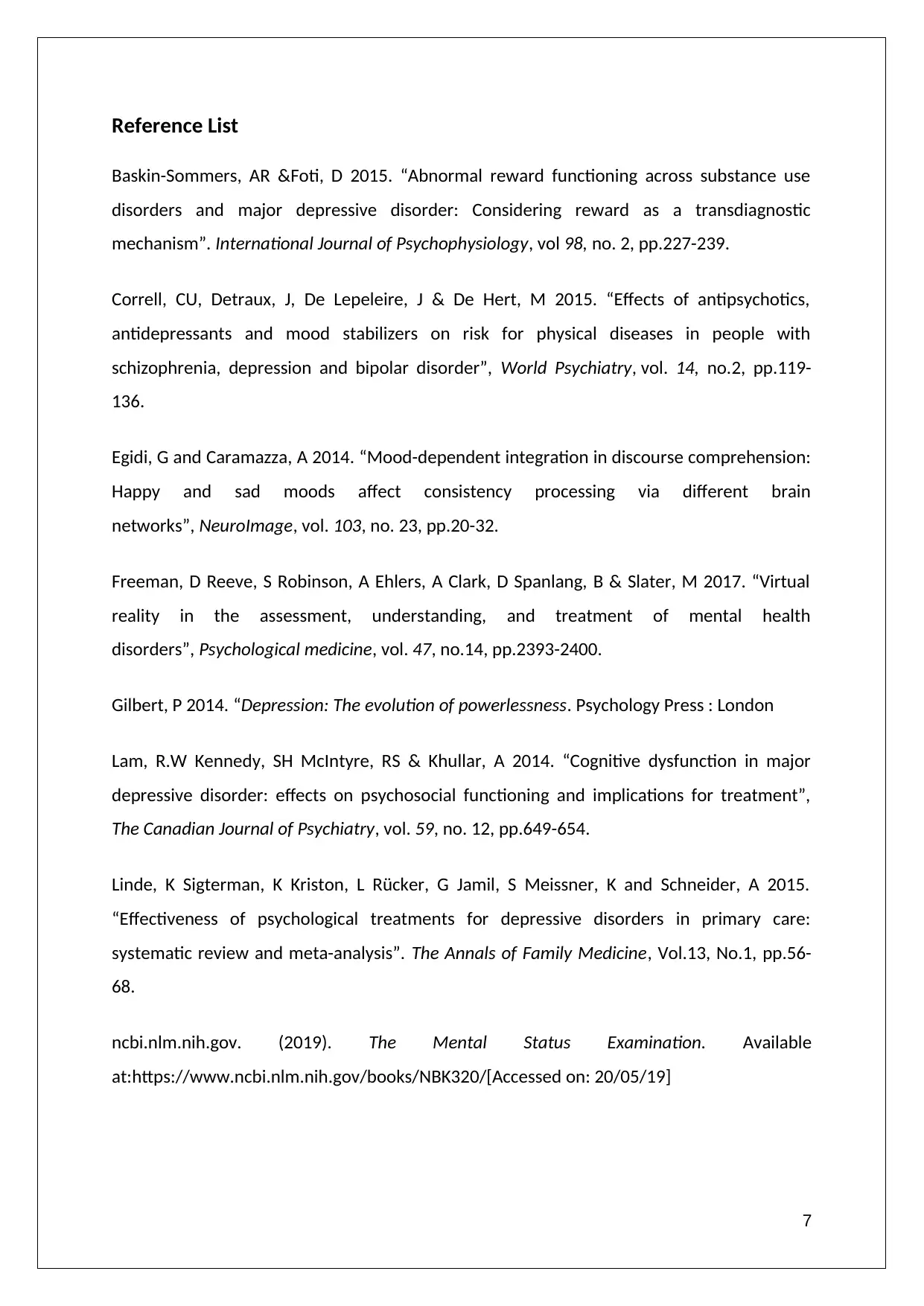
Reference List
Baskin-Sommers, AR &Foti, D 2015. “Abnormal reward functioning across substance use
disorders and major depressive disorder: Considering reward as a transdiagnostic
mechanism”. International Journal of Psychophysiology, vol 98, no. 2, pp.227-239.
Correll, CU, Detraux, J, De Lepeleire, J & De Hert, M 2015. “Effects of antipsychotics,
antidepressants and mood stabilizers on risk for physical diseases in people with
schizophrenia, depression and bipolar disorder”, World Psychiatry, vol. 14, no.2, pp.119-
136.
Egidi, G and Caramazza, A 2014. “Mood-dependent integration in discourse comprehension:
Happy and sad moods affect consistency processing via different brain
networks”, NeuroImage, vol. 103, no. 23, pp.20-32.
Freeman, D Reeve, S Robinson, A Ehlers, A Clark, D Spanlang, B & Slater, M 2017. “Virtual
reality in the assessment, understanding, and treatment of mental health
disorders”, Psychological medicine, vol. 47, no.14, pp.2393-2400.
Gilbert, P 2014. “Depression: The evolution of powerlessness. Psychology Press : London
Lam, R.W Kennedy, SH McIntyre, RS & Khullar, A 2014. “Cognitive dysfunction in major
depressive disorder: effects on psychosocial functioning and implications for treatment”,
The Canadian Journal of Psychiatry, vol. 59, no. 12, pp.649-654.
Linde, K Sigterman, K Kriston, L Rücker, G Jamil, S Meissner, K and Schneider, A 2015.
“Effectiveness of psychological treatments for depressive disorders in primary care:
systematic review and meta-analysis”. The Annals of Family Medicine, Vol.13, No.1, pp.56-
68.
ncbi.nlm.nih.gov. (2019). The Mental Status Examination. Available
at:https://www.ncbi.nlm.nih.gov/books/NBK320/[Accessed on: 20/05/19]
7
Baskin-Sommers, AR &Foti, D 2015. “Abnormal reward functioning across substance use
disorders and major depressive disorder: Considering reward as a transdiagnostic
mechanism”. International Journal of Psychophysiology, vol 98, no. 2, pp.227-239.
Correll, CU, Detraux, J, De Lepeleire, J & De Hert, M 2015. “Effects of antipsychotics,
antidepressants and mood stabilizers on risk for physical diseases in people with
schizophrenia, depression and bipolar disorder”, World Psychiatry, vol. 14, no.2, pp.119-
136.
Egidi, G and Caramazza, A 2014. “Mood-dependent integration in discourse comprehension:
Happy and sad moods affect consistency processing via different brain
networks”, NeuroImage, vol. 103, no. 23, pp.20-32.
Freeman, D Reeve, S Robinson, A Ehlers, A Clark, D Spanlang, B & Slater, M 2017. “Virtual
reality in the assessment, understanding, and treatment of mental health
disorders”, Psychological medicine, vol. 47, no.14, pp.2393-2400.
Gilbert, P 2014. “Depression: The evolution of powerlessness. Psychology Press : London
Lam, R.W Kennedy, SH McIntyre, RS & Khullar, A 2014. “Cognitive dysfunction in major
depressive disorder: effects on psychosocial functioning and implications for treatment”,
The Canadian Journal of Psychiatry, vol. 59, no. 12, pp.649-654.
Linde, K Sigterman, K Kriston, L Rücker, G Jamil, S Meissner, K and Schneider, A 2015.
“Effectiveness of psychological treatments for depressive disorders in primary care:
systematic review and meta-analysis”. The Annals of Family Medicine, Vol.13, No.1, pp.56-
68.
ncbi.nlm.nih.gov. (2019). The Mental Status Examination. Available
at:https://www.ncbi.nlm.nih.gov/books/NBK320/[Accessed on: 20/05/19]
7
Paraphrase This Document
Need a fresh take? Get an instant paraphrase of this document with our AI Paraphraser
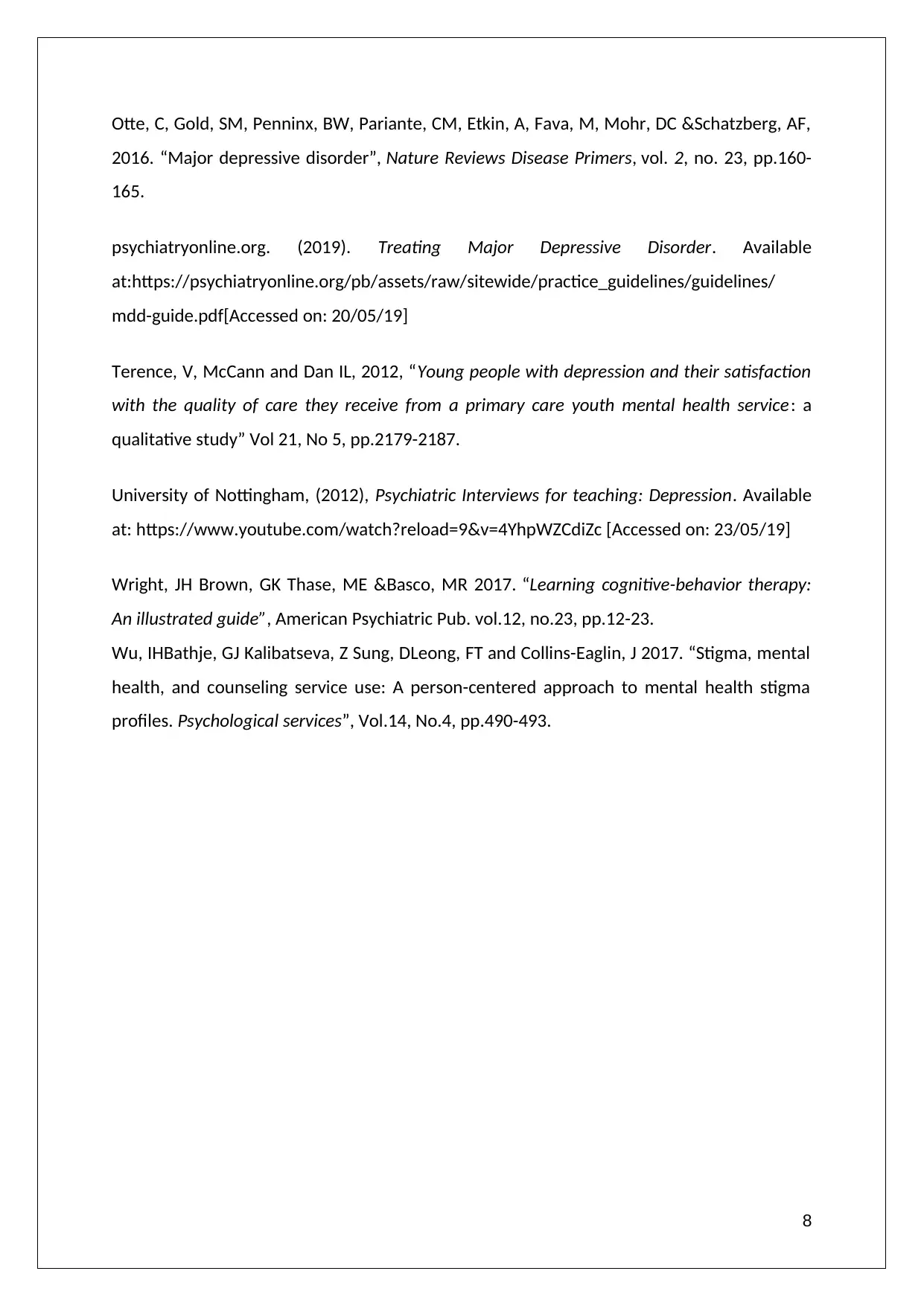
Otte, C, Gold, SM, Penninx, BW, Pariante, CM, Etkin, A, Fava, M, Mohr, DC &Schatzberg, AF,
2016. “Major depressive disorder”, Nature Reviews Disease Primers, vol. 2, no. 23, pp.160-
165.
psychiatryonline.org. (2019). Treating Major Depressive Disorder. Available
at:https://psychiatryonline.org/pb/assets/raw/sitewide/practice_guidelines/guidelines/
mdd-guide.pdf[Accessed on: 20/05/19]
Terence, V, McCann and Dan IL, 2012, “Young people with depression and their satisfaction
with the quality of care they receive from a primary care youth mental health service: a
qualitative study” Vol 21, No 5, pp.2179-2187.
University of Nottingham, (2012), Psychiatric Interviews for teaching: Depression. Available
at: https://www.youtube.com/watch?reload=9&v=4YhpWZCdiZc [Accessed on: 23/05/19]
Wright, JH Brown, GK Thase, ME &Basco, MR 2017. “Learning cognitive-behavior therapy:
An illustrated guide”, American Psychiatric Pub. vol.12, no.23, pp.12-23.
Wu, IHBathje, GJ Kalibatseva, Z Sung, DLeong, FT and Collins-Eaglin, J 2017. “Stigma, mental
health, and counseling service use: A person-centered approach to mental health stigma
profiles. Psychological services”, Vol.14, No.4, pp.490-493.
8
2016. “Major depressive disorder”, Nature Reviews Disease Primers, vol. 2, no. 23, pp.160-
165.
psychiatryonline.org. (2019). Treating Major Depressive Disorder. Available
at:https://psychiatryonline.org/pb/assets/raw/sitewide/practice_guidelines/guidelines/
mdd-guide.pdf[Accessed on: 20/05/19]
Terence, V, McCann and Dan IL, 2012, “Young people with depression and their satisfaction
with the quality of care they receive from a primary care youth mental health service: a
qualitative study” Vol 21, No 5, pp.2179-2187.
University of Nottingham, (2012), Psychiatric Interviews for teaching: Depression. Available
at: https://www.youtube.com/watch?reload=9&v=4YhpWZCdiZc [Accessed on: 23/05/19]
Wright, JH Brown, GK Thase, ME &Basco, MR 2017. “Learning cognitive-behavior therapy:
An illustrated guide”, American Psychiatric Pub. vol.12, no.23, pp.12-23.
Wu, IHBathje, GJ Kalibatseva, Z Sung, DLeong, FT and Collins-Eaglin, J 2017. “Stigma, mental
health, and counseling service use: A person-centered approach to mental health stigma
profiles. Psychological services”, Vol.14, No.4, pp.490-493.
8
1 out of 8
Related Documents
Your All-in-One AI-Powered Toolkit for Academic Success.
+13062052269
info@desklib.com
Available 24*7 on WhatsApp / Email
![[object Object]](/_next/static/media/star-bottom.7253800d.svg)
Unlock your academic potential
© 2024 | Zucol Services PVT LTD | All rights reserved.





